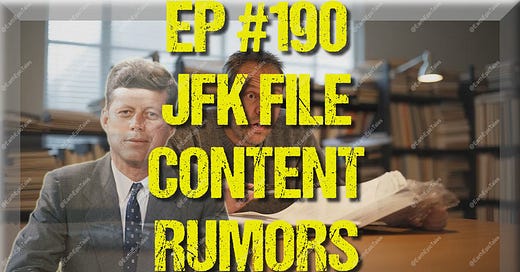In the soon-to-be released JFK files, we may find a plethora of information that could potentially alter our understanding of the events surrounding President John F. Kennedy's assassination and its aftermath. While it is impossible to predict every detail, here are several key areas where new revelations might emerge:
1. CIA involvement: One of the most significant possibilities is evidence of direct or indirect CIA involvement in JFK's assassination. This could include previously undisclosed communications between CIA operatives and Lee Harvey Oswald, who was accused of being the lone gunman responsible for Kennedy's death.
2. Mafia connections: There have long been rumors that organized crime played a role in JFK's assassination. The files might contain information about ties between the Mafia and individuals involved in the assassination plot, as well as potential pressure exerted on President Kennedy to crack down on mob activities.
3. Conspiracy theories: Many believe that JFK was a victim of a broader conspiracy involving multiple shooters or even an elaborate government cover-up. The files could provide evidence supporting these claims, such as previously undisclosed autopsy photographs or audio recordings from the Dallas Police Department's radio transmissions during the assassination.
4. Foreign influence: Some speculate that foreign governments, particularly those in Eastern Europe and the Middle East, may have had a hand in JFK's assassination due to his foreign policy stances. The files might reveal previously unknown communications between these countries and individuals involved in the plot.
5. Intelligence failures: It is possible that the released documents will shed light on intelligence failures leading up to the assassination, such as missed warnings or inadequate surveillance efforts. This could include information about the FBI's handling of Oswald before the event and their subsequent investigation into his activities.
6. Political motives: The files might provide insight into political motivations behind JFK's assassination, including potential tensions within the U.S. government or between Kennedy and other world leaders. This could involve previously undisclosed correspondence or memos discussing policy disagreements and power struggles.
7. Cover-up efforts: The documents may reveal attempts by various agencies to suppress information related to JFK's assassination, either to protect their own interests or to maintain the official narrative of a lone gunman. This could include evidence of tampering with physical evidence, witness intimidation, or manipulation of media coverage.
8. Assassination aftermath: The files might contain information about the immediate aftermath of JFK's assassination, including efforts to apprehend and interrogate suspects, as well as any subsequent investigations into potential conspiracies. This could include previously undisclosed testimony from key witnesses or individuals involved in the investigation.
9. Technological advancements: The files might also shed light on technological developments that were either used during JFK's assassination or later influenced our understanding of similar events, such as advances in ballistics analysis, acoustic forensics, or satellite imagery.
10. Personal insights: Lastly, the documents could provide a more comprehensive picture of President Kennedy's personal life and political ambitions, which might offer new context for his assassination and its aftermath. This could include previously undisclosed correspondence with family members, close friends, or political allies.













Share this post